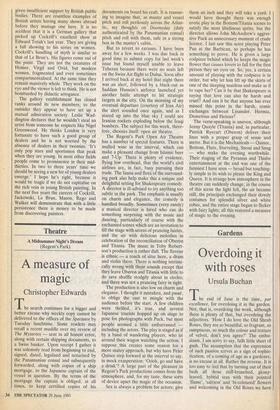Theatre
A Midsummer Night's Dream (Regent's Park)
A measure of magic
Christopher Edwards
The search continues for a bigger and better excuse why weekly copy cannot be delivered to the offices of the Spectator by Tuesday lunchtime. Some readers may recall a recent muddle over my review of The Mysteries — sent in all honest error, along with certain shipping documents, to a Swiss banker. Upon receipt I gather it was solemnly read from beginning to end, signed, dated, legalised and notarised by the Panamanian consul and subsequently forwarded, along with copies of a ship mortgage, to the Japanese captain of the vessel in question. By the terms of the mortgage the captain is obliged, at all times, to keep certified copies of his documents on board his craft. it is reassur- ing to imagine that, as master and vessel pitch and roll perilously across the Atlan- tic, my thoughts on Doomsday (duly authenticated by the Panamanian consul) pitch and roll with them, safe in a strong box in the master's cabin.
But to revert to excuses. I have been away for a few weeks. I was due back in good time to submit copy for last week's issue but found myself unable to leave Teheran because there were no seats left on the Swiss Air flight to Dubai. Soon after I arrived back at my hotel that night there was an alert, followed by a black-out as Saddam Hussein's airforce launched yet another futile attempt to hit strategic targets in the city. On the morning of my eventual departure (courtesy of Iran Air) the alert sounded once again, and as I stared up into the blue sky I could see Iranian rockets exploding below the Iraqi bombers. The subject for this week, there- fore, chooses itself: open air theatre.
The Regent's Park Open Air Theatre has a number of special features. There is mulled wine in the interval, which can make a pleasant change from Islamic beer and 7-Up. There is plenty of evidence, flying low overhead, that the world's civil airlines are, in fact, busy pursuing their trade. The fauna and flora of the surround- ing park also help make this a unique and delightful setting for Shakespeare comedy. A director is ill-advised to try anything toO subtle in the park. The emphasis is usually on charm and elegance, the comedy is handled broadly. Sometimes (very rarely) a musical director is hired who can do something surprising with the music and dancing, particularly of course with the enchanted scenes which are an invitation to fill the stage with scores of prancing fairies, and the air with delicious melodies in celebration of the reconciliation of Oberon and Titania. The music in Toby Robert- son's production is rather dull. The flavour is ethnic — a touch of sitar here, a drum and violin there. There is nothing intrinsi- cally wrong with these sounds except that they leave Oberon and Titania with little to do save shuffle stodgily about in circles; and there was not a prancing fairy in sight.
The production is also low on charm and elegance. I thought it mistaken, and passé, to oblige the cast to mingle with the audience before the start. A few children were thrilled, it's true, and several Japanese tourists hopped up on stage to pose for photographs with Puck, but most people seemed a little embarrassed — including the actors. The play is staged as if by a band of wandering players, who sit around their wagon watching the action. I
suppose , this creates some reason for a more matey approach, but why have Peter
Quince step forward at the interval to say, in mock exasperation: 'Odoh, go and have a drink'? A large part of the pleasure in Regent's Park productions comes from the atmosphere, and, for my taste, these sorts of device upset the magic of the occasion. Sex is always a problem for actors; give them an inch and they will take a yard. I would have thought there was enough erotic play in the Bottom/Titania scenes to satisfy the most libidinous sprite, but the director allows John McAndrew's aggres- sive Puck an unnecessary moment of crude licence. I last saw this actor playing Peter Pan at the Barbican, so perhaps he has something to prove. He is given a large codpiece behind which he keeps the magic flower that causes lovers to fall for the first person they set eyes on. So, yes, a certain amount of playing with the codpiece is in order, but why let him lift up the skirts of one of the sleeping maidens and make as if to rape her? Can it be that Shakespeare is saying that love can also be harsh and cruel? And can it be that anyone has ever missed this point in the harsh, comic exchanges between Lysander, Hermia, Demetrius and Helena?
The verse-speaking is uneven, although Jenny Quayle (Titania) and, in particular, Patrick Ryecart (Oberon) deliver their lines with a proper grasp of sense and metre. But it is the Mechanicals — Quince, Bottom, Flute, Starveling, Snout and Snug — who make the evening worthwhile. Their staging of the Pyramus and Thisbe entertainment at the end was one of the funniest I have seen — broad but touching- ly simple in its wish to please the King and Queen. It is strange how atmosphere in the theatre can suddenly change; in the course of this scene the light fell, the air became still, the principals exchanged their dowdy costumes for splendid silver and white robes, and the entire stage began to flicker with fairy lights; all this restored a measure of magic to the evening.


























































 Previous page
Previous page